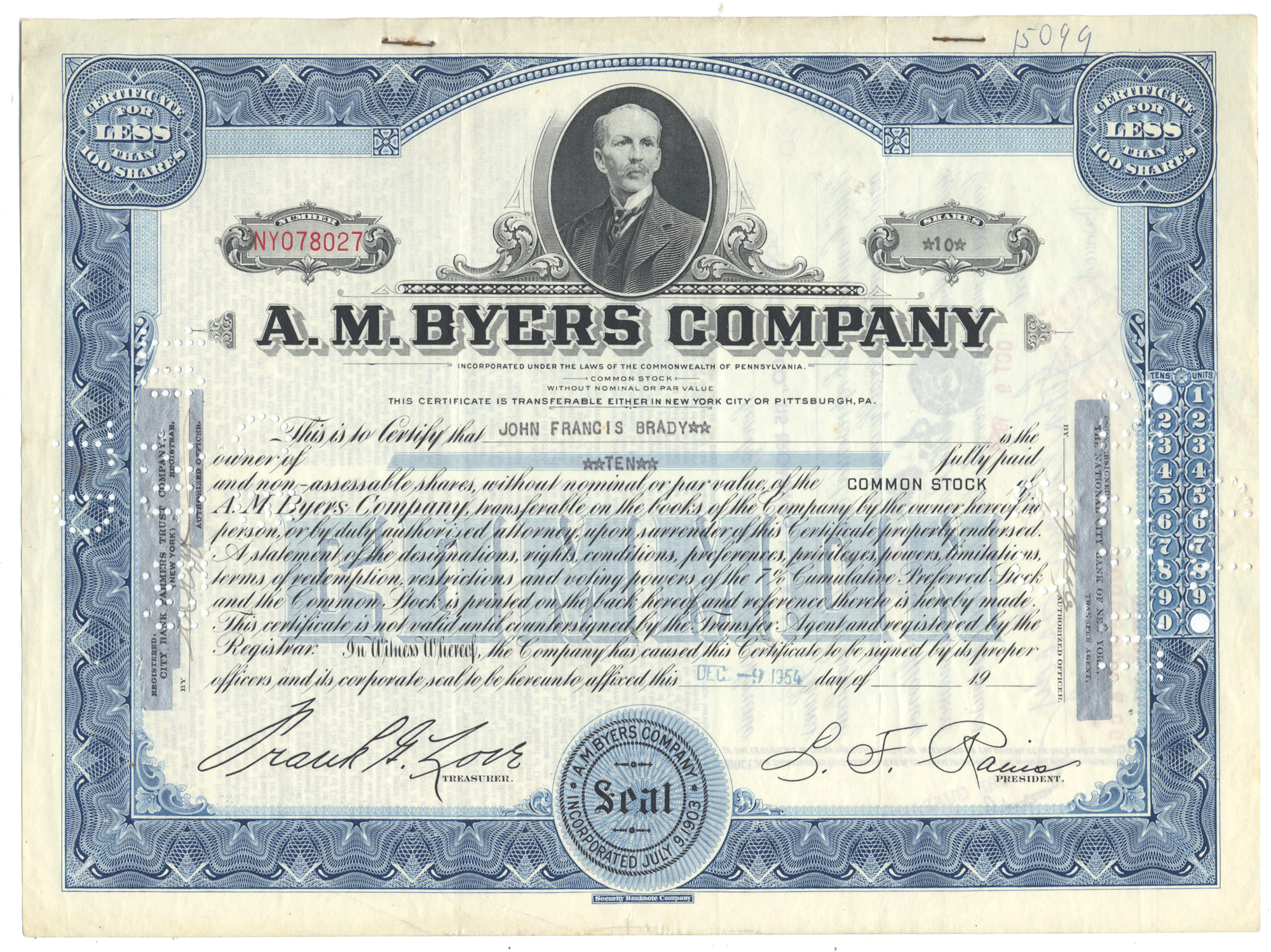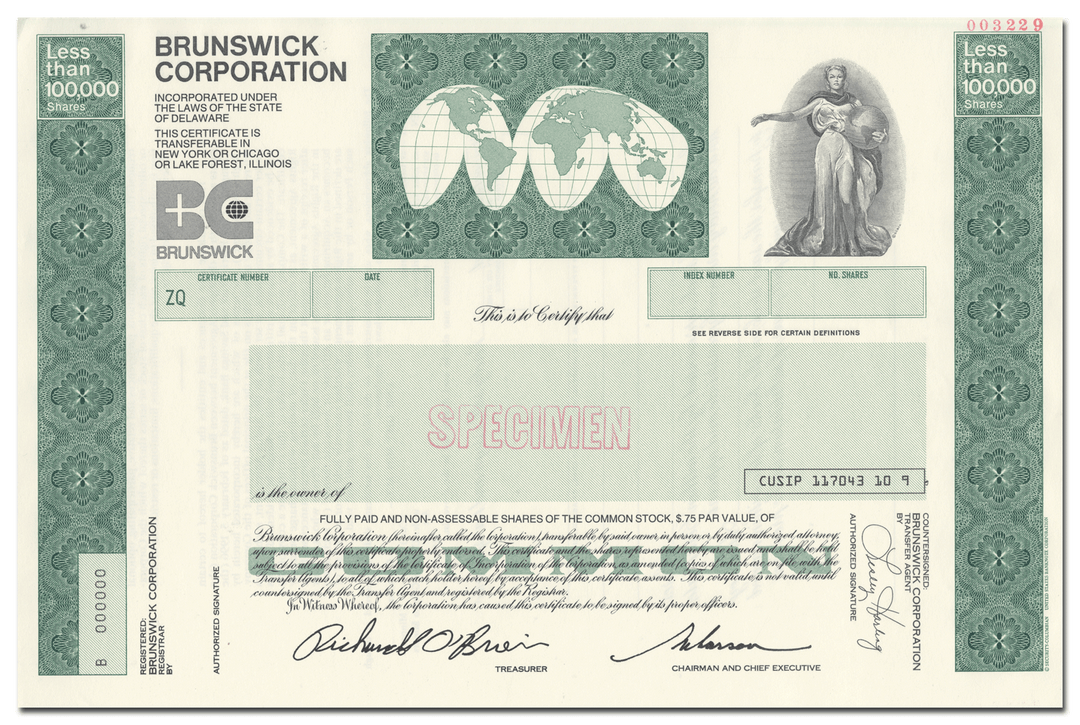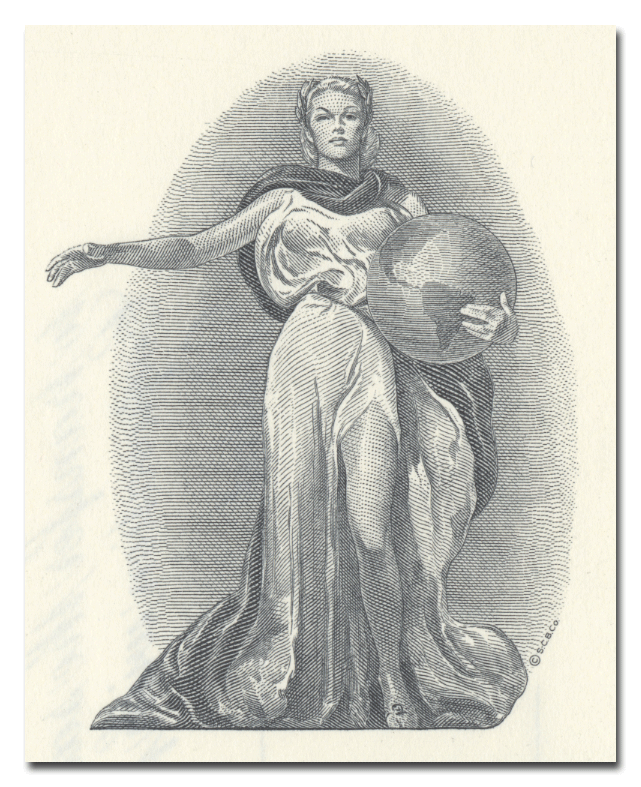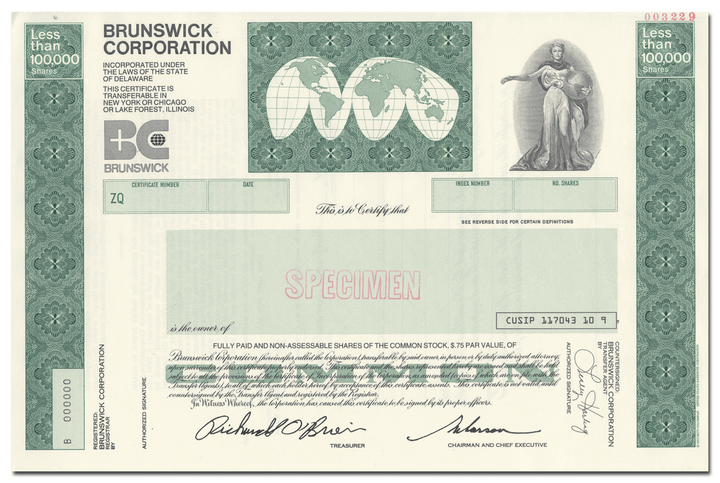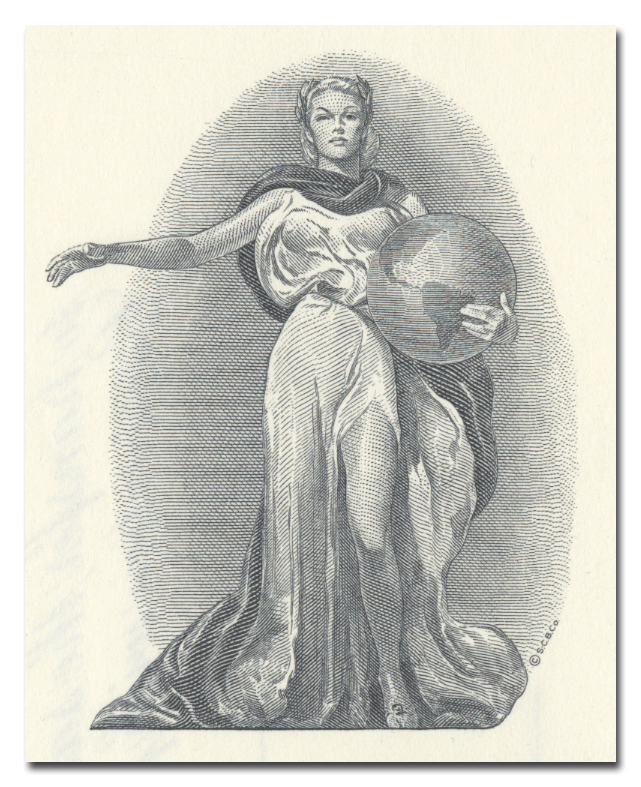Brunswick Corporation
- Guaranteed authentic document
- Orders over $100 ship FREE to U. S. addresses
Product Details
CompanyBrunswick Corporation
Certificate Type
Common Stock
Date Issued
Specimen, circa 1990's
Canceled
Yes
Printer
Security-Columbian/United States Bank Note Company
Signatures
Machine printed
Approximate Size
12" (w) by 8" (h)
Images
Show the exact certificate you will receive
Guaranteed Authentic
Yes
Additional Details
NA
Historical Context

Brunswick was founded by John Moses Brunswick who came to the United States from Switzerland at the age of 15. The J. M. Brunswick Manufacturing Company opened for business on September 15, 1845, in Cincinnati, Ohio. Originally J. M. Brunswick intended his company to be mainly in the business of making carriages, but soon after opening his machine shop, he became fascinated with billiards and decided that making billiard tables would be more lucrative, as the better tables then in use in the United States were imported from England. Brunswick billiard tables were a commercial success, and the business expanded and opened the first of what would become many branch offices in Chicago, Illinois in 1848. It was later renamed J. M. Brunswick & Brother by 1860, after a family member came on board, and the company's slogan at this time was: "The oldest and most extensive billiard table manufacturers in the United States".
In 1874, the Brunswick company merged with competitor Great Western Billiard Manufactory owned by Julius Balke to become the J. M. Brunswick & Balke Company. It was incorporated in 1879 with a capital stock of $275,000, the same year it merged with another competitor, H. W. Collender Company of New York City (founded by Hugh W. Collender), to acquire Collender's patented billiard cushions. In 1884, the partners formed the Brunswick-Balke-Collender Company (or B.B.C. Company for short) with capital of $1.5 million.
The company expanded into making a number of other products. Large ornate neo-classical style bars for saloons were a popular product. Bowling balls, pins, and equipment led a growing line of sporting equipment. It popularized bowling balls of manufactured materials, vulcanized rubber at first; earlier bowling balls had been solid wood.
In the early 20th century, Brunswick expanded the product line to include such diverse products as toilet seats, automobile tires, and phonographs. In the late 1910s, they introduced a quickly-popular line of disc phonograph records, under the name Brunswick Records. In 1930, Brunswick sold the control of the record company to Warner Brothers and came out with a line of refrigerators.
During World War II, Brunswick-Balke-Collender made small target-drone aircraft for the U.S. military. After the war, Brunswick introduced a line of school furniture. In 1955, the Brunswick "Model A" Mechanical Pinsetter fully automated unit premiered, for the purpose of handling bowling pins for the sport of tenpins, in competition with American Machine and Foundry (AMF). Previously, Brunswick had made two models of semi-automated, manually operated "spotting tables" for the tenpin sport, that the "Model A" unit replaced. The 1950s also saw the introduction of a line of golfing equipment to compete with AMF in the leisure products and sporting goods markets.
The Brunswick-Balke-Collender Company officially changed its name to the Brunswick Corporation on April 10, 1960. The following year the company reported sales of $422 million. Brunswick acquired Mercury Marine in 1961. In the 1970s, Brunswick introduced the automatic scorer, which electronically tallied the score instead of the bowler doing it by hand.
The Brunswick Corporation patented a machine gun using a delayed blowback operation using a fluted chamber as part of the weapon's operation. Another platform was the Rifleman's Assault Weapon, an unusual grenade launcher that used a spherical rocket propelled grenade.
In the 1980s, Brunswick became a major maker of yachts and pleasure boats, whose brands include Bayliner, Boston Whaler, Maxum, Sea Ray, and Trophy.
During the Gulf War, Brunswick supplied the military with camouflage nets. They also made radomes for the Patriot missile.
In 1997, Brunswick purchased the Roadmaster bicycle division, one of the last U.S. manufacturers of low-cost, mass-market bicycles. However, it became apparent that continued U.S. manufacture of such products was not viable in the presence of surging low-priced imports from overseas producers, primarily China. In 1999, Brunswick sold its Roadmaster bicycle division and brand to Pacific Cycle.
In 2001, Brunswick acquired Hatteras Yachts from Genmar Industries for approximately $80 million in cash.
Related Collections
Additional Information
Certificates carry no value on any of today's financial indexes and no transfer of ownership is implied. All items offered are collectible in nature only. So, you can frame them, but you can't cash them in!
All of our pieces are original - we do not sell reproductions. If you ever find out that one of our pieces is not authentic, you may return it for a full refund of the purchase price and any associated shipping charges.




